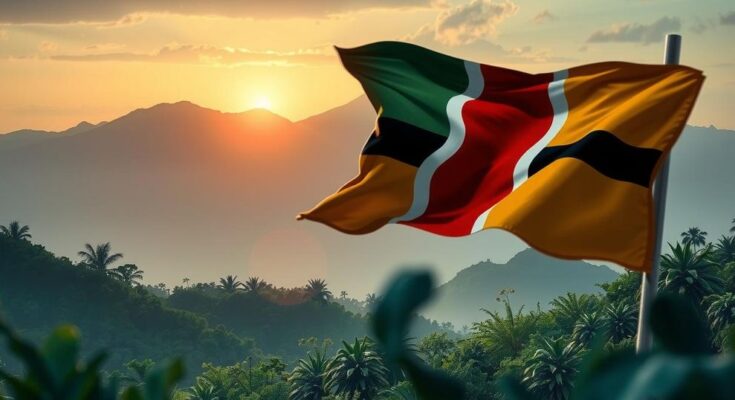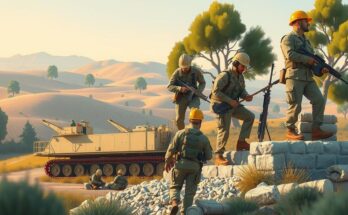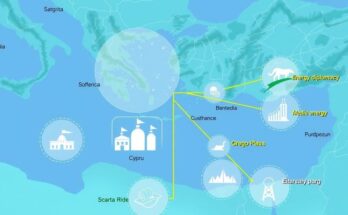Recent hostilities between South Africa and Rwanda over the conflict in the Democratic Republic of Congo have resulted in the deaths of South African peacekeepers. President Cyril Ramaphosa claimed the Rwanda-backed M23 rebels are responsible, prompting tensions to escalate as Rwanda’s President Paul Kagame countered these accusations. This situation reflects the complexities of historical military alliances and current geopolitical dynamics within the region.
South Africa and Rwanda’s diplomatic tensions have escalated after President Cyril Ramaphosa accused the Rwanda-supported M23 rebel group for the deaths of South African peacekeepers in the Democratic Republic of Congo (DRC). This conflict intensified as the M23 captured significant territories, including Goma, leading South Africa to warn that further attacks on its troops would constitute a “declaration of war.” Rwanda’s President Paul Kagame retaliated by labeling South Africa as a “belligerent force” in the conflict.
The recent clashes have resulted in the deaths of 13 South African soldiers as fighting escalated in DRC’s eastern region, which has seen South Africa’s peacekeeping forces increasingly targeted. Historical tensions between the two nations surface again, reminiscent of past incidents such as the 2014 expulsion of diplomats following an attack on an exiled Rwandan dissident in South Africa. Despite some diplomatic communications aimed at defusing tensions, the situation remains volatile.
South Africa’s military involvement in DRC is strategic, aimed at stabilizing the region and protecting economic interests, given DRC’s wealth in minerals. South Africa’s force is primarily composed of its own troops, operating under SAMIDRC as part of a regional peacekeeping effort led by the Southern African Development Community (SADC). Recent military setbacks have raised questions about the effectiveness of these forces amidst dwindling resources.
President Ramaphosa emphasized the need for immediate peace talks following discussions with Kagame. However, the rhetoric has hardened with Ramaphosa asserting that M23 attacks, along with support from Rwandan forces, have led to fatalities among South African troops. In retaliation, Kagame dismissed these allegations, insisting that the claims stem from misinformation and suggested that accountability lies with the Congolese army, FARDC.
The complexities increase as Kagame criticized South Africa’s ability to mediate effectively in DRC, implying that if South Africa desired confrontation, Rwanda would respond accordingly. Tensions are compounded by the legacy of historical military involvement that dates back to the aftermath of apartheid, with China’s peacekeeping mission a notable point of discussion.
The military’s declining budget has left South Africa unable to leverage air power, drastically hindering their operational capabilities against M23’s resurgence. Analysts indicate that this situation may necessitate a reevaluation of military goals and the impact of maintaining forces in such volatile conditions. Security must be prioritized, yet so too must the potential political ramifications of troop withdrawals, a task ultimately subject to SADC’s decision-making processes.
Moving forward, President Ramaphosa faces challenging decisions regarding troop deployment in DRC amid escalating dangers and political fallout, including the prospects of negotiating with Rwanda for a safer withdrawal.
The ongoing conflict in the Democratic Republic of Congo (DRC) involves multiple armed groups, notably the M23 rebels, who have garnered support from Rwanda. The DRC has been a site of protracted conflict, often drawing in neighboring countries, and is marked by humanitarian crises resulting from violence. South Africa has been involved in peacekeeping efforts following the end of apartheid in the 1990s, motivated by both a commitment to regional stability and economic interests given DRC’s rich mineral resources. The recent resurgence of the M23 has reignited tensions not only within DRC but also between South Africa and Rwanda, complicating an already precarious geopolitical landscape.
The standoff between South Africa and Rwanda illustrates the fragility of diplomatic relations amidst armed conflicts in the DRC. As casualties mount, the need for urgent peace negotiations is paramount. However, entrenched positions and accusations further complicate resolution efforts, spotlighting the historical complexities of military involvement in the region. Decisions regarding South African troop presence now hinge on broader political and military assessments within SADC, revealing the intricate ties between security and diplomacy in the face of rising geopolitical tensions.
Original Source: www.bbc.co.uk




